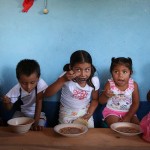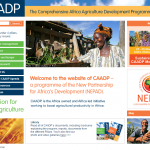Investing in preschool nutrition has long-term positive health and economic impacts, and failing to invest can do long-term damage. Since 2002, IFPRI’s work on this topic has included studies in many countries, including Guatemala and Zimbabwe.
UK (Department for International Development)
A longstanding partner to IFPRI, the United Kingdom’s Department for International Development (DFID) is the largest bilateral donor to development-focused research. As such, DFID fosters the new technologies and ideas that are essential to tackling some of our greatest challenges. In June 2002, the International Development Act made poverty reduction the official focus of DFID’s work, and the department has risen to meet the challenge. DFID’s support has contributed to IFPRI’s work tackling root causes of hunger, particularly in Africa. It emphasizes improving agricultural productivity and innovation, promoting climate change resiliency, and ensuring food and nutrition security through cash transfers, biofortification, and other means. In 2010, IFPRI’s collaborated with DFID’s Foresight Food and Farming study that produced innovative evidence on the increasing pressure on the global food system.
Recently at IFPRI’s 40th Anniversary event, Tim Wheeler, Deputy Chief Scientific Adviser for DFID shared how IFPRI’s evidence-based research has impacted the agency and its work towards food and nutrition security. He said, “IFPRI has been at the forefront of many aspects of development…successful in elevating debates to high-level policymakers transforming development packages.”
For more on the projects that IFPRI and DFID partnered together, please go to this brochure.
HarvestPlus
Since 2004, HarvestPlus has been working to combat micronutrient malnutrition, also known as “hidden hunger,” which afflicts billions of people worldwide.
The Comprehensive Africa Agriculture Development Programme: Long-Term Strategic Analysis for Improved Growth and Poverty Reduction
MOTIVATION After years of declining investment in rural development and low agricultural productivity, the African Union Commission launched the Comprehensive Africa Agriculture Development Programme (CAADP) in 2003. Participating African governments committed to allocate 10 percent of their national budgets to agriculture in order to help achieve a 6 percent annual agricultural growth rate. With USAID >> Read more
- « Previous Page
- 1
- …
- 3
- 4
- 5


